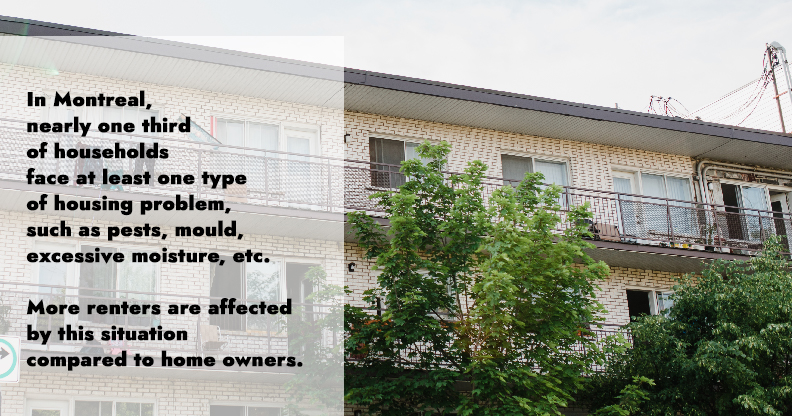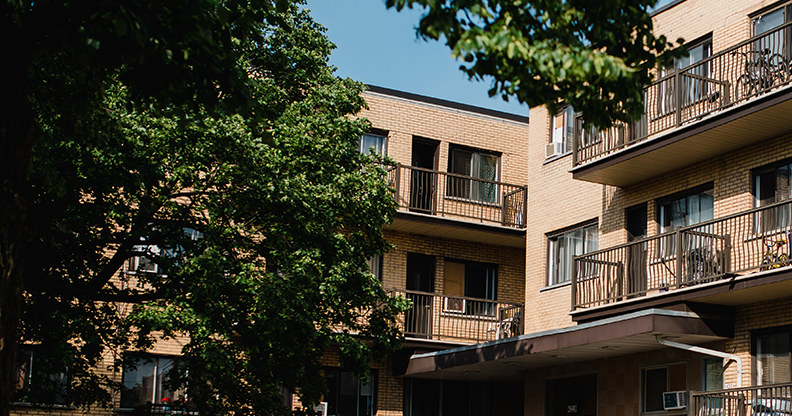With summer moving season just around the corner, the issue of housing has never been more timely. However, the challenges associated with this essential need are not new. The Montreal housing market has evolved in recent years, and vulnerable people are finding it harder to find adequate housing that they can afford.
Housing conditions have a domino effect on other aspects of life and can impact things like physical and mental health, family and social relationships, and children.
The pandemic has forced all of us to self-isolate at home, a situation that has exacerbated stress for people already experiencing rental insecurity. Overcrowding in small apartments, experiencing abuse from landlords, and not being able to move during the pandemic are just some of the problems that arise from this context.
To fulfill its mission, Centraide of Greater Montreal is surrounded by an entire community network that is seriously tackling this issue to help vulnerable people find better housing. Below is a great example of this work.

The Safe Housing Brigade in Côte-des-Neiges
Housing scarcity, rising rents, and the state of disrepair of available rental units in many neighbourhoods give cause for concern, as even housing that is substandard will have takers.
Côte-des-Neiges is the neighbourhood with the highest number of people living on a low income on the Island of Montreal. Poverty forces many tenants to live in inadequate housing.
The Safe Housing Brigade in Côte-des-Neiges comes to the aid of these renters. This Collective Impact Project (CIP) initiative came about in 2019 through the collaborative work of various community and public stakeholders. The goal is to come up with new ways to address housing problems by focusing on innovation and creativity. The project offers intensive support to individuals and families facing unsanitary housing conditions at all stages of their process to improve their situations.
Staff with the Brigade provide assistance to low-income individuals and families who do not live in adequate housing. They support their efforts to improve their housing situations, which is often a difficult and complex process. They provide tenants with ongoing guidance and follow-up until their problems are resolved. They collaborate intensively with multiple partners according to their respective roles, such as the borough’s inspection service, the regional public health department, the CIUSSS, and the Office municipal d’habitation de Montréal (OMHM).
The Brigade is unique particularly because of its outreach to isolated and vulnerable people living in deteriorated or run-down housing, as the team can connect with these people to identify their needs and find the appropriate solutions. Staff members give one-on-one assistance and, if necessary, provide support to groups of tenants in the same building . They also work with different municipal stakeholders, such as the borough’s inspection service.
Un project with concrete impacts
The Safe Housing Brigade is aiming to help about 200 tenants who may have a combination of vulnerability factors, such as not knowing the laws or their rights or not speaking French or English. Tenants may also be reluctant to use the different types of available recourse out of a fear of retaliation from their landlords.
Thanks to this project, tenants feel more confident and less alone or isolated when trying to have problems with their apartments fixed or when dealing with a difficult landlord. Some get referrals to and support from community resources that may or may not relate to housing and housing conditions (e.g. social workers or other CIUSSS resources, community organizations, women’s shelters).
This initiative has also led to concrete results. For example, unsanitary apartments have been decontaminated. Hallways and apartments have been cleaned following work. Dwellings have been exterminated for pest infestations. Water has been restored to homes. Heating has been turned back on or repaired. Urgent work has been done (e.g. painting, roofing, windows, plumbing, doors). Relationships between tenants and landlords have improved.
When necessary, notices and statements of offence have been issued to some landlords. Health inspectors from the City and resource people from the Commission des normes, de l’équité, de la santé et de la sécurité du travail (CNESST) have helped resolve or improve health problems experienced by tenants who received support.
Despite the challenges caused by the pandemic, the project’s leaders and its partners have spared no effort to adapt to the new context and continue to work to solve problems related to substandard housing.
The Safe Housing Brigade has been made possible thanks to an investment from the Collective Impact Project (CIP) steered by Centraide. The CIP provides support to 17 Montreal neighbourhoods, with donations totalling $23 million from major foundations over a six-year period.



